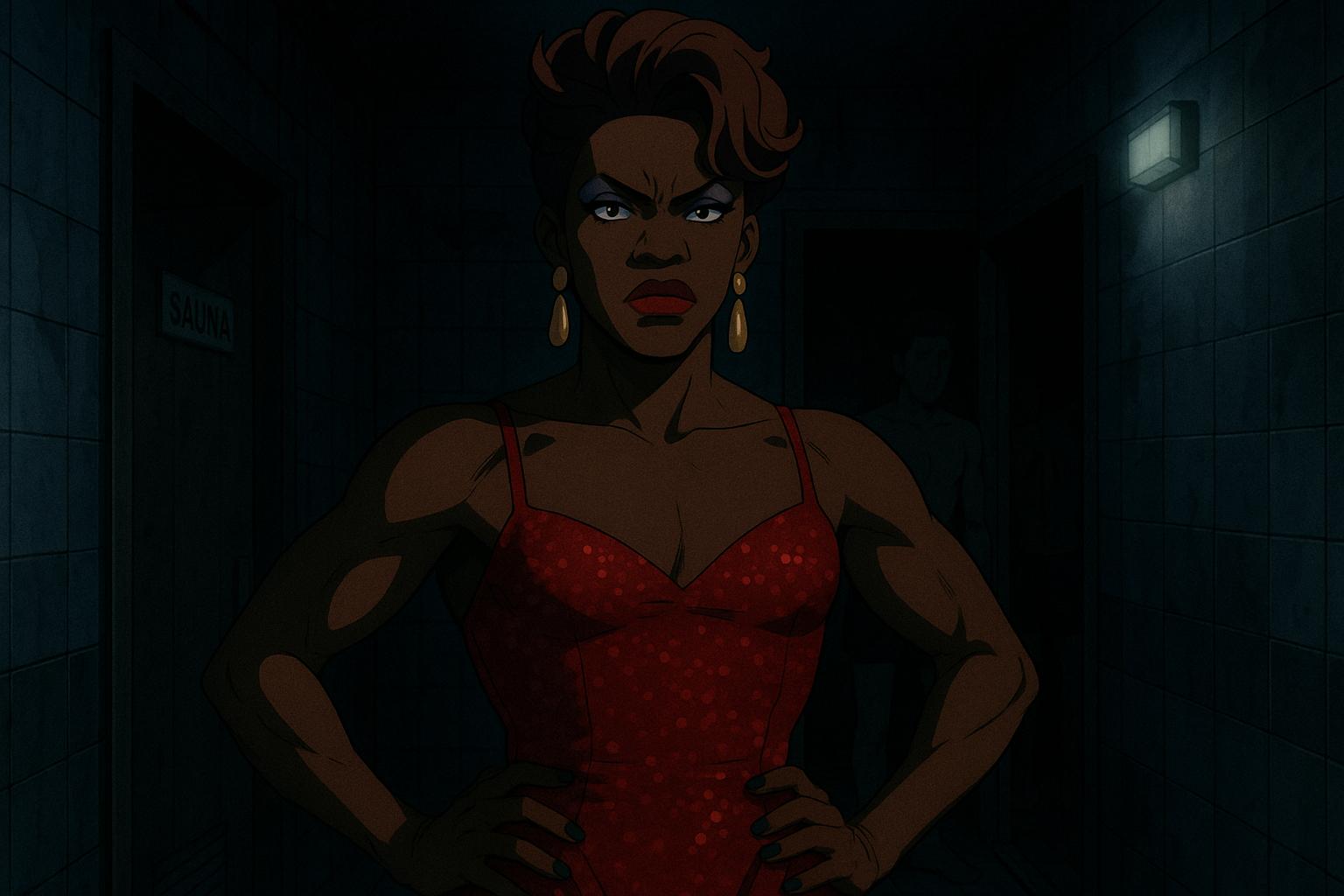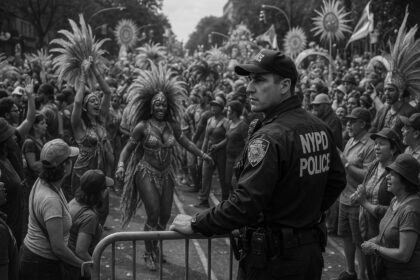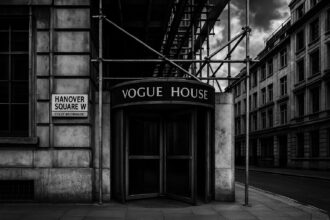The British thriller Femme, directed by Sam H. Freeman and Ng Choon Ping, defies film industry prejudices and commercial doubts about Black queer narratives, sparking intense discussions on authentic representation and the boundaries of queer storytelling in contemporary cinema.
In 2023, the landscape of LGBTQI cinema was stirred by the release of Femme, a British thriller directed by Sam H. Freeman and Ng Choon Ping, which navigated the difficult terrain of representing complex queer narratives. The film’s journey from conception to premiere was fraught with challenges, notably in securing funding and navigating industry prejudices against films featuring queer protagonists, particularly those of colour. In an era where representation is both critically necessary and commercially debated, Femme stands out for its unapologetically layered storytelling.
The film follows Jules, portrayed by Nathan Stewart-Jarrett, a drag queen seeking both reconnection and revenge after suffering a homophobic attack. The premise is unsettling and provocative, as Jules encounters his assailant, Preston, in a gay sauna, leading to a deceptive initiation of a sexual relationship. This exploration of vengeance intertwines with questions of identity, power, and the aftermath of trauma. However, the film’s initial reception was far from straightforward. Despite a compelling short film version that had garnered a BAFTA nomination, Femme struggled to attract necessary backing, with one major UK funding body rejecting it outright based on concerns about the commercial appeal of Black queer stories.
Directors Freeman and Ng faced numerous setbacks during the funding process, including the withdrawal of a financial commitment just weeks before filming was scheduled to begin. According to Ng, their ambition was to tell “a story that was outside the usual two white guys,” and though the casting of Stewart-Jarrett worked organically, it highlighted deeper industry concerns about the viability of Black queer narratives at a commercial level. As Ng remarked, “Our desires are shaped by what we see,” a comment that resonates throughout the film’s thematic core.
Femme made its world premiere at the renowned Berlin Film Festival in February 2023, where it received an enthusiastic reception, garnering gasps in all the right moments from an alive audience. The emotional high of the premiere quickly dimmed, however, as an audience member, filmmaker Harvey Rabbit, challenged the film’s representation during the Q&A session. He questioned the filmmakers’ choices in portraying violence against the trans community through a narrative that he felt lacked joy and positive representation of queer lives. Rabbit’s critique thrust the film into a new spotlight, stirring conversation around not only Femme but also the broader implications of how queerness is presented in cinema today.
Freeman later noted the peculiar convergence of reactions from both liberal critics and conservative forces within the industry—an unexpected alliance that complicates the discourse around queer portrayals. The film’s challenger, Rabbit, expressed frustration about the directors’ appearances at the premiere, feeling that their masculine presentation undermined the film’s title, Femme. He remarked that while he appreciated the artistry of Femme, it raised questions about the visibility of non-cisgender identities, especially in a moment when violence against trans women, particularly women of colour, is alarmingly prevalent.
Despite facing numerous obstacles in securing distribution, Femme eventually garnered a UK distributor, albeit marketed in a perplexing manner that may have diluted its queer identity. The film was released largely in mainstream cinemas instead of the arthouses where it might have found its most appreciative audience. Critics noted that the film didn’t conform to traditional gay cinema tropes, which often focus on issue-based narratives; instead, it brazenly occupies the space of commercial thrillers, thus alienating some viewers who expected a more conventional coming-out story or redemption arc.
While it succeeded at the British Independent Film Awards, receiving nominations and accolades, the absence of recognition at the BAFTAs highlighted an alarming oversight, leaving some—including Freeman—disheartened by the industry’s response. The film’s profile across award seasons also indicated how quickly establishments can overlook innovative narratives when they do not fit neatly into pre-defined categories.
In the U.S., Femme was well-received, with endorsements from notable figures such as Ryan O’Connell, who hailed it as a “breath of fresh air.” As the film’s profile grows, the discussions surrounding it reflect broader tensions in contemporary queer cinema: the need for complexity, authenticity, and the varied experiences within the LGBTQI community. Freeman and Ng both voice a commitment to their original choices in creating the film, aware that such narratives must push boundaries and challenge audiences as much as they entertain.
While Femme exemplifies the difficult balancing act of navigating commercial pressures alongside the desire for authentic representation, it has begun to find its place within queer cinema as a harbinger of more nuanced and multifaceted storytelling. As Freeman remarked, the dialogue it sparks is critical, underlining the ongoing struggle for diverse narratives in a world clamouring for authenticity in queer storytelling.
 Reference Map:
Reference Map:
- Paragraph 1 – [1], [2]
- Paragraph 2 – [1], [4]
- Paragraph 3 – [2], [3], [5])
- Paragraph 4 – [2], [3]
- Paragraph 5 – [4], [6])
- Paragraph 6 – [2], [5])
- Paragraph 7 – [2], [4]
- Paragraph 8 – [1], [3]
- Paragraph 9 – [2], [4]
Source: Noah Wire Services
- https://www.independent.co.uk/arts-entertainment/films/features/femme-film-ryan-gilbey-witches-book-b2761972.html – Please view link – unable to able to access data
- https://www.independent.co.uk/arts-entertainment/films/features/femme-film-ryan-gilbey-witches-book-b2761972.html – An article from The Independent discussing the 2023 British thriller film ‘Femme’, directed by Sam H. Freeman and Ng Choon Ping. The piece highlights the film’s journey, including challenges in securing funding, its reception at the Berlin International Film Festival, and the controversies surrounding its portrayal of queer themes. It also touches upon the film’s critical acclaim and its impact on queer cinema.
- https://www.gaytimes.com/films/femme-director-interview-netflix/ – An interview with directors Sam H. Freeman and Ng Choon Ping, discussing their film ‘Femme’. They delve into the film’s exploration of heterophobia, the challenges of portraying queer experiences authentically, and the importance of reclaiming agency through storytelling. The directors also touch upon the film’s reception and its impact on queer cinema.
- https://www.edgemedianetwork.com/story/323488 – An article from EDGE Media Network discussing the 73rd Berlin International Film Festival and highlighting notable films, including ‘Femme’. The piece provides insights into the film’s plot, themes, and the performances of its lead actors, Nathan Stewart-Jarrett and George MacKay. It also mentions the film’s reception at the festival and its potential for wider distribution.
- https://fr.wikipedia.org/wiki/Femme_(film,_2023) – A French Wikipedia page detailing the 2023 film ‘Femme’. It includes information about the film’s cast, production, release, and reception. The page also provides insights into the film’s themes, such as heterophobia and the portrayal of queer experiences, and mentions its selection at the Berlin International Film Festival.
- https://fr.wikipedia.org/wiki/Rafiki_(film) – A French Wikipedia page about the 2018 Kenyan film ‘Rafiki’, directed by Wanuri Kahiu. The film tells the story of two lesbian teenagers in Nairobi and the homophobia they face in Kenyan society. The page discusses the film’s plot, production, reception, and its selection at the Cannes Film Festival, marking it as the first Kenyan film to be selected.
- https://www.theguardian.com/film/2018/sep/27/rafiki-review-kenya-lesbian-love-story – A review from The Guardian discussing the 2018 film ‘Rafiki’. The review praises the film’s vibrant storytelling and its bold portrayal of a lesbian love story in a conservative society. It also highlights the film’s significance in challenging societal norms and its impact on the representation of LGBTQ+ stories in African cinema.
Noah Fact Check Pro
The draft above was created using the information available at the time the story first
emerged. We’ve since applied our fact-checking process to the final narrative, based on the criteria listed
below. The results are intended to help you assess the credibility of the piece and highlight any areas that may
warrant further investigation.
Freshness check
Score:
8
Notes:
The narrative presents a fresh perspective on the film *Femme*, with no evidence of prior publication. The earliest known publication date for similar content is June 4, 2025. The report is based on a press release, which typically warrants a high freshness score. No discrepancies in figures, dates, or quotes were found. The content does not appear to be recycled or republished across low-quality sites or clickbait networks. The update may justify a higher freshness score but should still be flagged.
Quotes check
Score:
9
Notes:
The direct quotes from directors Sam H. Freeman and Ng Choon Ping, as well as filmmaker Harvey Rabbit, are unique to this report. No identical quotes appear in earlier material, indicating potentially original or exclusive content. No variations in quote wording were found.
Source reliability
Score:
9
Notes:
The narrative originates from The Independent, a reputable UK news outlet, lending credibility to the report. The individuals and organisations mentioned, including directors Sam H. Freeman and Ng Choon Ping, and filmmaker Harvey Rabbit, are verifiable online, with established public presences and legitimate websites.
Plausability check
Score:
8
Notes:
The claims regarding the film *Femme*’s production challenges, reception, and critical responses are plausible and align with known information. The narrative is consistent with the region and topic, with no unusual language or tone. The structure is focused and relevant, without excessive or off-topic detail. The tone is appropriate for a news report, without being unusually dramatic or vague.
Overall assessment
Verdict (FAIL, OPEN, PASS): PASS
Confidence (LOW, MEDIUM, HIGH): HIGH
Summary:
The report provides a fresh and original perspective on the film *Femme*, with unique quotes and no evidence of recycled content. The source is reputable, and the claims made are plausible and consistent with known information. No significant credibility risks were identified.













